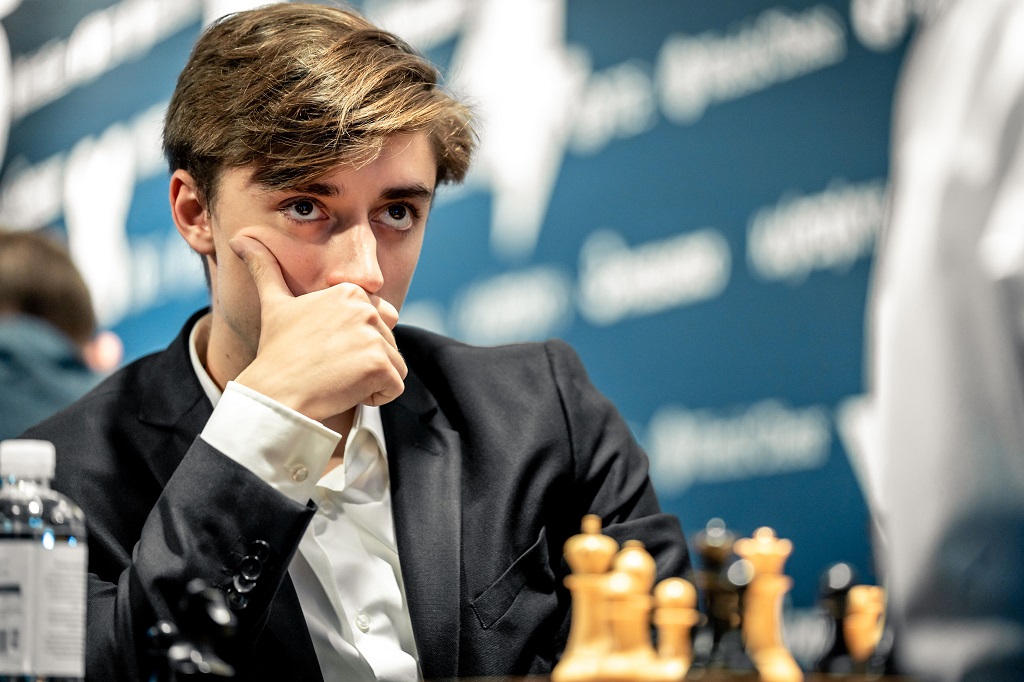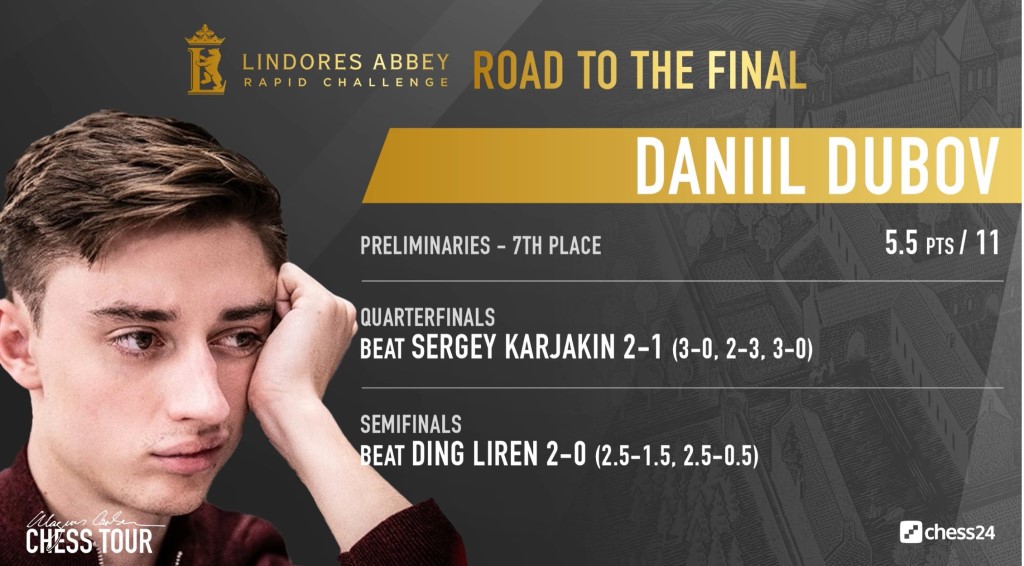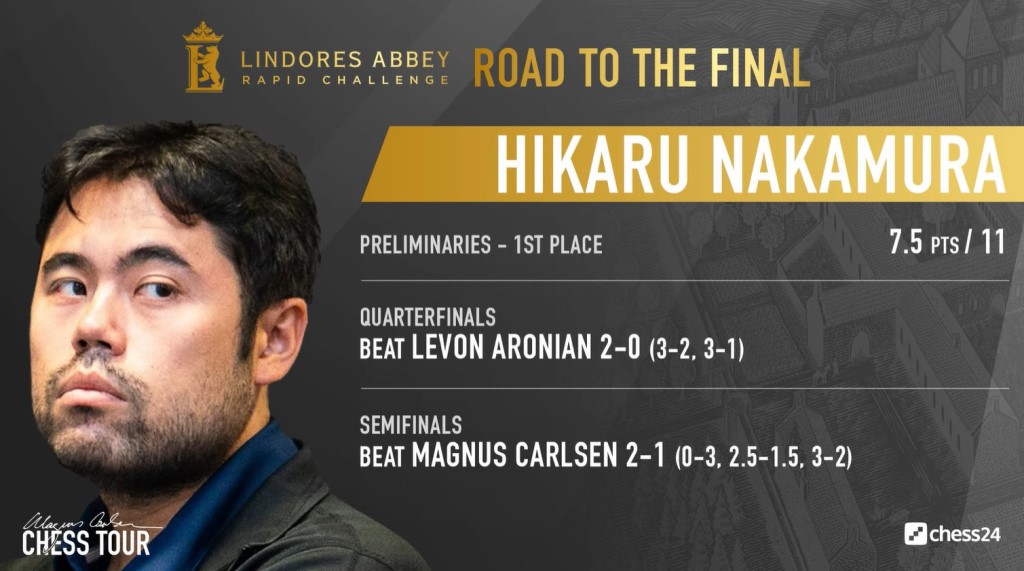


ChessBase 17 - Mega package - Edition 2024
It is the program of choice for anyone who loves the game and wants to know more about it. Start your personal success story with ChessBase and enjoy the game even more.
The Lindores Abbey Chess Challenge started on May 18th. Twelve players are taking part. After a three-day preliminary, the best eight players will advance to the deciding knockout section. The time control is 15 minutes for the game, with a 10-second increment per move.
Avoiding mistakes is especially important in rapid and blitz. Online-chess specialist Hikaru Nakamura knows this all too well, and extensively uses it to his advantage. In the first mini-match of the final, he played quickly and confidently, leaving Daniil Dubov without a chance to create the messy positions that suit his style.
Dubov reacted adequately, realizing that all he could do to stop his opponent was to focus on speed and mistake avoidance. He later explained:
After yesterday I sort of decided to play some mirror chess. [...] For today, I decided, okay, I'll do pretty much the same thing, I will play random sort of normal moves quickly. And it kind of worked out.
The strategy gave him a 2½:1½ victory, which takes the final into a third, deciding rubber.
Talking about the first mini-match, the Russian noted that some technical difficulties had distracted him a bit. He added that some of these problems also affected Nakamura, though, and concluded that his American colleague fully deserved the win.
Meanwhile, Nakamura announced on Twitter that he will take a break from his heavy schedule of streams prior to the deciding four-game mini-match:
Taking the day off after 60+ days of streaming. See everyone tomorrow!
— Hikaru Nakamura (@GMHikaru) June 2, 2020
Both players are aware of the strategy that better suits this format and this pairing, but who will prevail in the end? The games kick off at 16:00 CEST (14:00 UTC/10:00 EST).
Master Class Vol.1: Bobby Fischer
No other World Champion was more infamous both inside and outside the chess world than Bobby Fischer. On this DVD, a team of experts shows you the winning techniques and strategies employed by the 11th World Champion.
Grandmaster Dorian Rogozenco delves into Fischer’s openings, and retraces the development of his repertoire. What variations did Fischer play, and what sources did he use to arm himself against the best Soviet players? Mihail Marin explains Fischer’s particular style and his special strategic talent in annotated games against Spassky, Taimanov and other greats. Karsten Müller is not just a leading international endgame expert, but also a true Fischer connoisseur.


Against Dubov's Sicilian in game one, Nakamura steered away from theoretical Najdorfs and such by playing the Alapin. On the other hand, Dubov quickly demonstrated that he was not going to force the game into sharper territories:
Sicilian Defense with 2.c3 - Alapin Variation
Sergei Tiviakov started playing the line 1.e4 c5 2.c3 in the Sicilian Defence as White in 1988. Since then, he has employed it in more than 100 games, including a yearlong period when he I managed to win twelve 2.c3-games in a row. White tries to occupy the centre with a second pawn, and Black must know his stuff very well in order to be able to equalize. And this is only possible with 2...Nf6 – all other lines give the first player a small edge everywhere. Especially against stronger opponents, 2.c3 is an excellent weapon.
11...Qe6 offered a queen swap which was duly accepted. Black went on to get a better structure in the middlegame, and steadily organized his forces against White's weak backward pawn on d2. The pawn was captured on move 31:
White could have continued defending passively with 31.Rc2, for example, but went for a speculative counterattack with 31.Nh4 instead — he was already under heavy pressure, so it is hard to criticize this decision. Dubov went on to finish the job: 31...Rxd2 32.Nf5 Rxa2 33.Rxa2 g6 34.hxg6 hxg6 etcetera. It took a while from this point on, but the Russian only increased his advantage before securing the full point.
Nakamura did not get many chances in games two and three. In the must-win fourth encounter, he played the Leningrad Dutch with black and eventually got a slight edge in a static structure. Dubov was solid as well, though, and found the right time to simplify the position into a configuration that could more easily lead to a draw:
Chess Endgames 7 - Endgame Principles Weaknesses & Fortresses
The 7th volume of this endgame series deals with many different aspects of endgame play: the art of pawn play, weaknesses, converting an advantage, stalemate, fortresses, the art of defence and typical mistakes. Learn how to convert an extra piece or an exchange or how to exploit space advantage and better mobility. The themes the art or defence, fortress and stalemate are also intertwined. If your position has a solid fundament then you may surprisingly reach a fortress which might even be based on a stalemate.
Dubov calculated carefully and realized that 37.e4 was tactically justified. Nakamura tried to keep the game going, but by doing so gave his opponent some chances. Given the circumstances, Dubov exchanged pieces and held the balance until securing match victory with a draw.
Select an entry from the list to switch between games